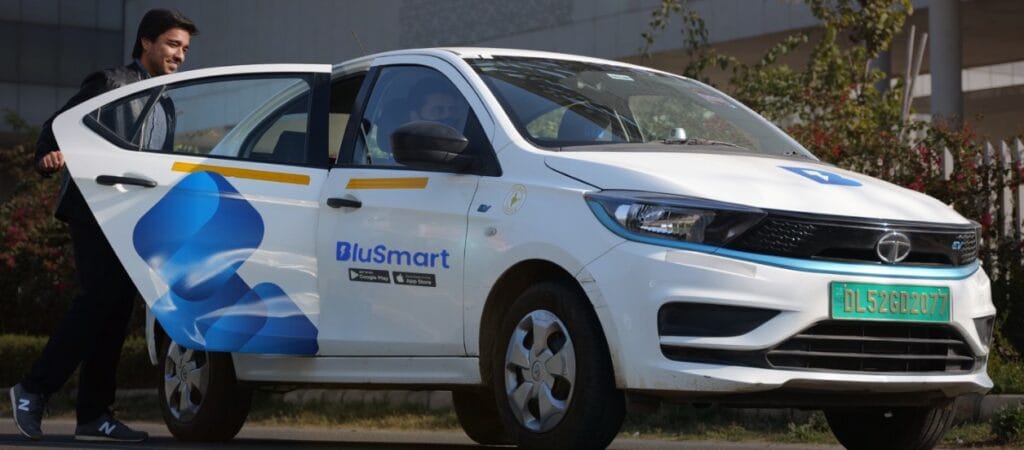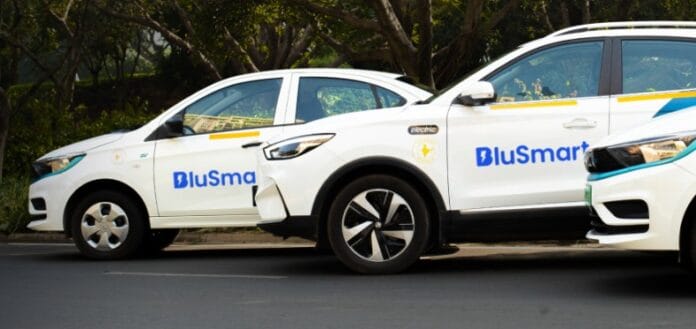April 14, 2025: The Gurugram-headquartered electric ride-hailing startup BluSmart is preparing to exit its core ride-hailing operations and transition into a fleet partner for Uber, according to people familiar with the company’s strategic restructuring. This move marks a full circle for EV ride-hailing firm, which initially entered the market in 2019 in a similar capacity — operating as a fleet manager before attempting to build its own platform.
The decision comes on the back of a severe cash crunch, a failed funding round, and deepening financial challenges at its promoter firm, Gensol Engineering.
From Disruptor to Partner: BluSmart’s Business Model Overhaul

BluSmart’s leadership and shareholders have reportedly approved a plan to begin transferring its EV fleet to Uber in phases, starting with around 700–800 vehicles in the coming weeks. Once the transition is complete, BluSmart will wind down its independent ride-hailing business entirely, according a report by ET.
This pivot essentially repositions BluSmart from a consumer-facing platform to a back-end fleet operator — supporting Uber’s growing electric vehicle category, Uber Green, launched in India in 2023.
As per the new arrangement, vehicles either owned or leased by EV ride-hailing firm will operate on the Uber platform, with the startup earning a share of fare revenues while Uber retains its platform commission — the same model it uses for existing fleet partners like Everest Fleet, Lithium Urban Technologies, and Moove.
Burning Fast: The Financial Fire Behind the Pivot
The pivot isn’t a growth strategy — it’s a survival tactic.
The Electric Ride-Hailing startup has been burning over ₹20 crore every month, a number that proved unsustainable without fresh investor support. Founders Anmol Singh Jaggi and Puneet Singh Jaggi, who also promoted Gensol Engineering, had been personally pumping capital into the business alongside external funding rounds.
But with Gensol Engineering itself facing a debt crisis, additional capital became hard to come by. Earlier this year, the EV ride-hailing startup tried raising $50 million in a fresh funding round — but the effort fell flat, with no commitments from existing investors.
The company’s liquidity issues came to a head in March, when employee salaries were delayed, sparking internal concern. In a company-wide email, Anmol Jaggi cited “cash flow constraints” and assured that dues would be cleared in phases by the end of April.
Structural Shocks: Top Team Exits, Expansion Paused
The financial turbulence has led to internal upheaval as well. Over the past few weeks, key members of BluSmart’s leadership team have exited the company, including: Anirudh Arun, CEO of BluSmart Fleet, Rishabh Sood, CTO, Tushar Garg, Chief Business Officer and former Uber India executive
The company has also shut down its international operations in Dubai and shelved plans to expand to Saudi Arabia — a sharp reversal from its previously global ambitions.
Falling Deals, Fading Prospects
The crisis has also affected external partnerships. A deal to sell nearly 3,000 EVs — originally leased from Gensol and operated by BluSmart — to Chennai-based Refex Industries fell apart in March. According to sources, the vehicles’ condition after prolonged usage on BluSmart’s platform was a key factor behind the termination.
Refex, ironically, is one of Uber’s fleet partners — highlighting how the ride hailing startup is now playing catch-up in a space it once hoped to dominate.
Meanwhile, discussions for a possible investment from Uber itself remain on the table, but the deteriorating financial health of the ride-hailing startup has reportedly made the talks uncertain.
A Milestone Amid Mayhem: 25 Million Rides and ₹790 Crore ARR
In the midst of this ongoing transformation, BluSmart is still trying to showcase signs of strength. On LinkedIn, co-founder Punit K Goyal announced that the startup has crossed 25 million electric rides and achieved an annualised revenue run rate (ARR) of ₹790 crore (~$93 million) — a significant operational milestone by any standard.
“We are proud to announce that the startup’s all-electric fleet has completed over 2.5 crore trips since launch,” Goyal wrote. “This demonstrates the growing adoption of clean mobility in India.”
What’s Next: A Second Life on Someone Else’s Platform
BluSmart’s decision to shutter its own app and fleet operations doesn’t spell the end of its journey, but it’s clearly a strategic retreat. What once positioned itself as a green challenger to Ola and Uber is now becoming part of the very system it sought to disrupt.
Whether this pivot can revive BluSmart’s fortunes or simply prolong the inevitable remains to be seen. One thing is clear: in India’s rapidly evolving electric mobility ecosystem, adaptability is no longer a luxury — it’s the only way forward.



